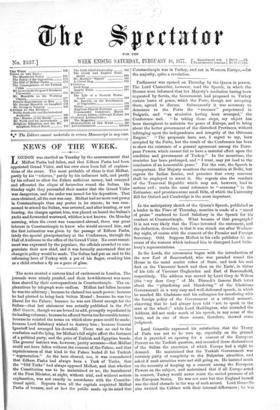The news created a curious kind of excitement in London.
The journals were utterly puzzled, and their bewilderment was more than shared by their correspondents in Constantinople. The ex- planations by telegraph were endless. Midhat had fallen because he was too arbitrary ; because he claimed too much power; because he had plotted to bring back Sultan Murad ; because he was too liberal for the Palace ; because he was not liberal enough for the Sultan—that last statement was actually published in the Pall Mall Gazette, though we are bound to add, promptly repudiated in its leading columns; because he offered Servia too favourable terms; because he resisted the terms on which alone peace could be made; because Lord Salisbury wished to destroy him ; because General Ignatieff had arranged his downfall. There was no end to the confusion and the lying, for Midhat's fall might affect the fortunes of a political party, and the price of Turkish and Egyptian bonds. The general instinct was, however, pretty accurate—that Midhat could not 'have fallen without the consent of,the Palace, and that capriciousness of that kind in the Palace boded ill for Turkish "regeneration." As the haze cleared, too, it was remembered that Edhein Pasha had always been a Turk of Turks, that the "Old Turks" had always opposed Midhat, and that whether the Constitution was to be maintained or no the banishment of the First Minister, at night, without trial, and without serious explanation, was not exactly in accordance with the Constitu- tional spirit. Reports from all the capitals acquitted Midhat Pasha of treason, and at last the public made up its mind that
Constantinople was in Turkey, and not in Western Europe,—for the majority, quite a revelation.


































